Related Research Articles

The Bolsheviks, led by Vladimir Lenin, were a far-left faction of the Marxist Russian Social Democratic Labour Party (RSDLP) which split with the Mensheviks at the Second Party Congress in 1903. The Bolshevik party, formally established in 1912, seized power in Russia in the October Revolution of 1917, and was later renamed the Russian Communist Party, All-Union Communist Party, and Communist Party of the Soviet Union. The party's ideology, based on Leninist and later Marxist–Leninist principles, is known as Bolshevism.
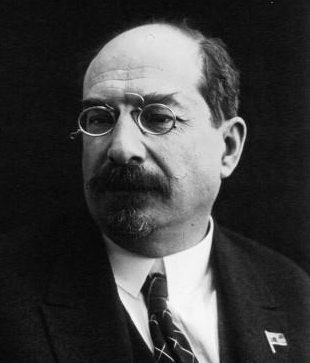
Anatoly Vasilyevich Lunacharsky was a Russian Marxist revolutionary and the first Bolshevik Soviet People's Commissar (Narkompros) responsible for the Ministry of Education as well as an active playwright, critic, essayist, and journalist throughout his career.
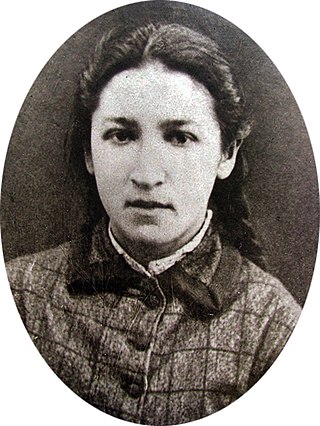
Vera Ivanovna Zasulich was a Russian socialist activist, Menshevik writer and revolutionary. She is widely known for her correspondence with Karl Marx, in which she put into question the necessity of a capitalist industrialisation prior to socialism, in the context of the fact that there already were living farmer communities in Russia that had developed practices and cultures that had a communist component.

Lev Grigorievich Deutsch, also known as Leo Deutsch was a Russian Marxist revolutionary and one of four founding members of Russia's Marxist Organisation, the precursor of the Russian Social Democratic Labour Party.
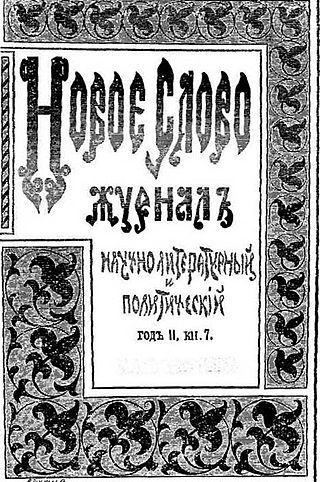
Novoye Slovo was the title of two separate Russian magazines published in Saint Petersburg, the first appearing between 1893 or 1895, and 1897 and the second in the fall of 1917.

Zhizn was a Russian magazine published first in Saint Petersburg (1897-1901), then in London and Geneva (1902).
Legal Marxism was a Russian Marxist movement based on a particular interpretation of Marxist theory whose proponents were active in socialist circles between 1894 and 1901. The movement's primary theoreticians were Pyotr Struve, Nikolai Berdyaev, Sergei Bulgakov, Mikhail Tugan-Baranovsky and Semyon Frank. The name was derived from the fact that its supporters promoted their ideas in legal publications.
Vladimir Aleksandrovich Posse was a Russian socialist journalist and editor who typically signed his articles V. A. Posse.
Yedinstvo or Edinstvo was a faction within the Russian Social Democratic Labor Party (RSDLP) between 1914 and 1917 and then a small independent party in 1917 and 1918. It was led by Georgi Plekhanov.

Alexander Nikolayevich Potresov was a Russian social democratic politician and one of the leaders of the Menshevik faction of the Russian Social Democratic Labour Party. He was one of six original editors of the newspaper Iskra, under the pen name "Starover".
Prosveshcheniye was a legal Bolshevik socio-political and literary monthly magazine in Russia.
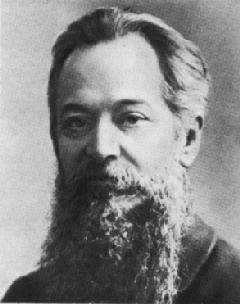
Nikolai Frantsevich Danielson was a Russian socio-political figure, economist, publicist, and one of the theoreticians of liberal populism. He is also famous for his translations of Das Kapital by Marx, and being a writer on Russian economic development.

Sergei Nikolaevich Prokopovich was a Russian economist, sociologist, Revisionist Social-Democrat and later a liberal politician.

Alexander Lvovich Parvus, born Israel Lazarevich Gelfand and sometimes called Helphand in the literature on the Russian Revolution, was a Marxist theoretician, publicist, and controversial activist in the Social Democratic Party of Germany.

Georgi Valentinovich Plekhanov was a Russian revolutionary, philosopher and Marxist theoretician. He was a founder of the social-democratic movement in Russia and was one of the first Russians to identify himself as Marxist. Facing political persecution, Plekhanov emigrated to Switzerland in 1880, where he continued in his political activity attempting to overthrow the Tsarist regime in Russia. Plekhanov is known as the "father of Russian Marxism".
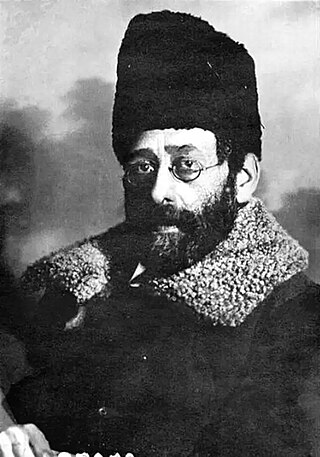
Yuliy Osipovich Tsederbaum, better known as Julius Martov, was a Russian revolutionary, politician, and the leader of the Mensheviks, a faction of the Russian Social Democratic Labour Party (RSDLP). A close associate of Vladimir Lenin prior to 1903, Martov broke with him following the RSDLP's ideological schism, after which Lenin led the opposing faction, the Bolsheviks.
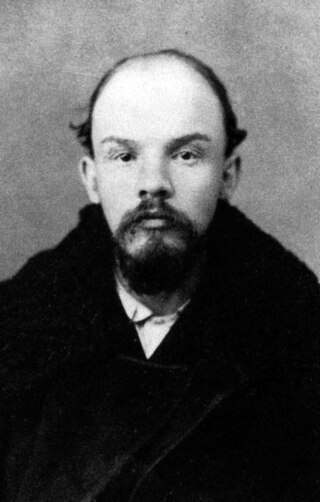
The Russian communist revolutionary and politician Vladimir Lenin began his active revolutionary activity in 1892, and continued till assuming power in the Russian Revolution of 1917. Following on from his early life, during which he had become devoted to the cause of revolution against the Tsarist regime in the Russian Empire and converted to Marxism, Lenin moved to St. Petersburg. There he joined a revolutionary cell, and became a vocal advocate for Marxism within the revolutionary socialist movement. Entering a relationship with fellow Marxist Nadezhda Krupskaya, he toured Western Europe to build ties with other Russian revolutionary emigres and learn more about the international Marxist movement. Upon returning to Russia, he was arrested for sedition in 1895 and exiled to Shushenskoye in the Minusinsky District of eastern Siberia for three years. There, he devoted his time to translating and writing revolutionary texts, marrying Krupskaya in July 1898.
Revolutionary socialism is a political philosophy, doctrine, and tradition within socialism that stresses the idea that a social revolution is necessary to bring about structural changes in society. More specifically, it is the view that revolution is a necessary precondition for transitioning from a capitalist to a socialist mode of production. Revolution is not necessarily defined as a violent insurrection; it is defined as a seizure of political power by mass movements of the working class so that the state is directly controlled or abolished by the working class as opposed to the capitalist class and its interests.
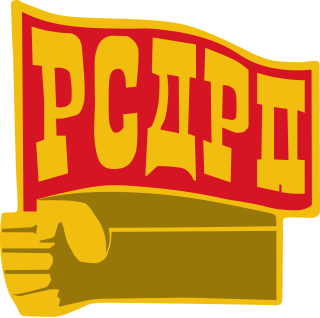
The Russian Social Democratic Labour Party (RSDLP), also known as the Russian Social Democratic Workers' Party or as the Russian Social Democratic Party, was a socialist political party founded in 1898 in Minsk.

Nikolai Yevgrafovich Fedoseyev was a pioneer of Marxism in the Russian Empire.
References
- ↑ Lenin, Collected Works, Progress Publishers Moscow, Volume 10, pp. 323-324
- ↑ The Beginning of an Era